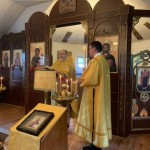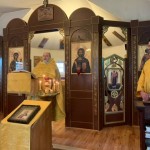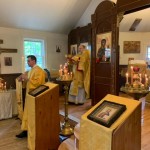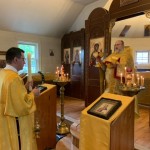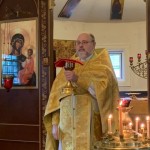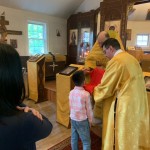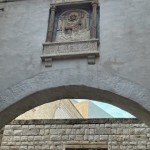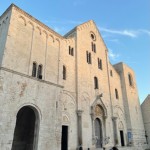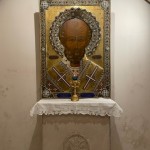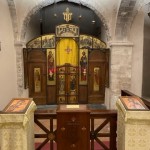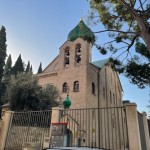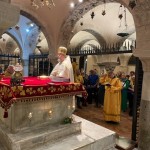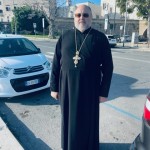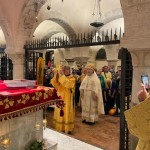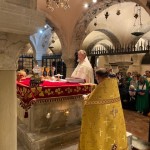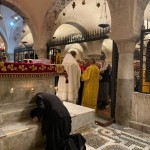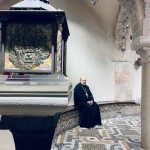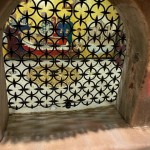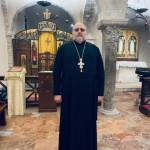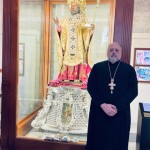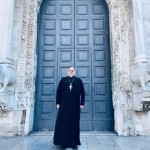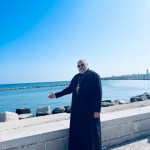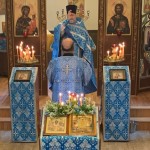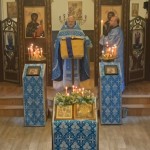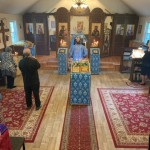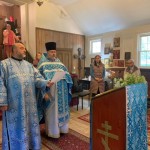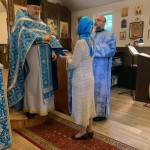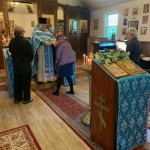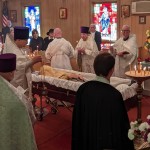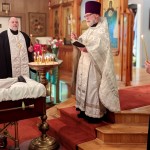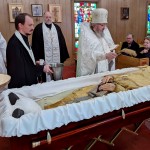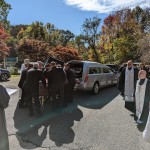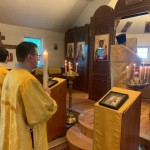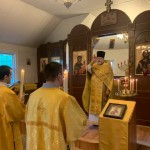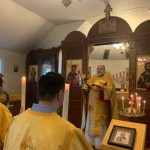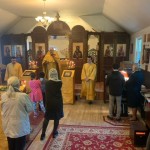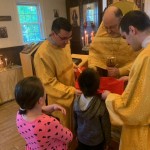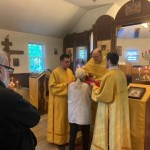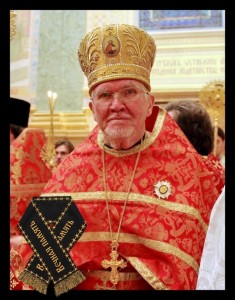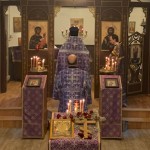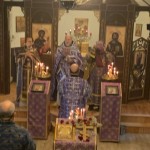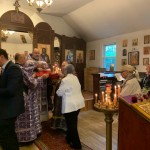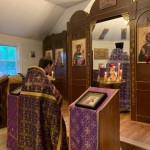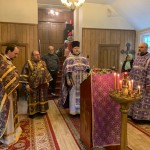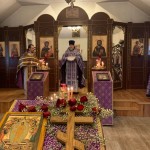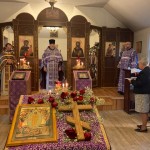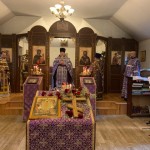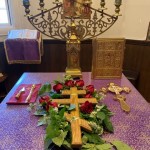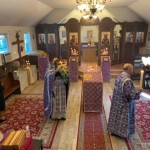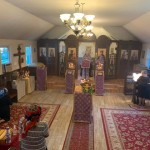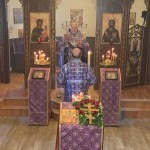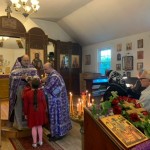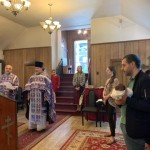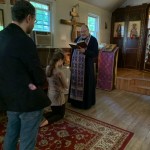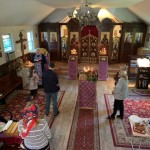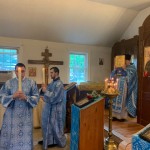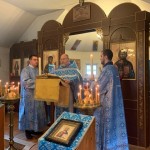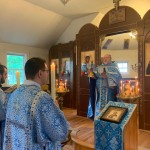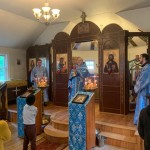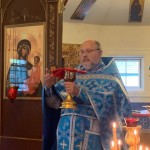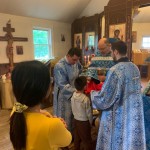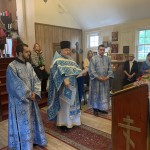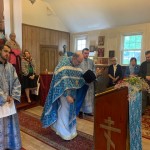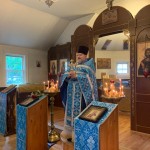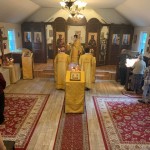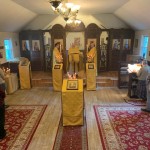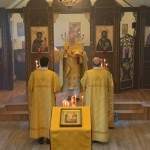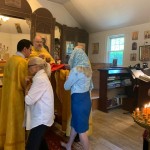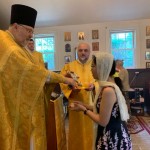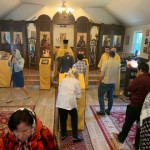On November 6, on the 21st Sunday after Pentecost, St. George parish resumed its services after a two-week break due to our Rector’s leave. We had the Divine Liturgy served by Archpriest Igor Tarasov after his return from Italy. After the reading from the Holy Gospel Fr. Igor preached the following homily:
“Dear brothers and sisters in Christ! Today’s Gospel lesson is telling us about life beyond the grave. It is describing the destiny of the two human souls after death. It tells us about a rich man who lived very nice life and a beggar who suffered. They lived totally different kinds of life, but their lives came to the same end: both of them died. However, this was not the end of their existence. They continued to live, and their destiny became different again (Lk. 16, 19-31)”.
“So, today we may talk a little bit about life after death. This subject is very mysterious and pretty much unknown to us. People had always been puzzled by the question, “what happens when we die””.
“The Church of Christ teaches us that death is a separation of the soul from the body. It also teaches that after death the soul continues to live and awaits its future resurrection and the Last Judgment. When we recite or sing the Creed we finish up by saying, “I wait for the resurrection of the dead and the life everlasting”. But even before the resurrection of the dead the souls of the dead people are alive. Furthermore, after death they already receive a partial judgment according to their deeds. Today’s Gospel story about a rich man and Lazarus describes what happens to the human souls after they are judged. After his death, poor Lazarus was carried by the angels to Abraham’s bosom while the rich man ended up in hell”.
“Today we can reflect what is expecting us beyond the grave. Unfortunately, many contemporary people do not hear much truth about that. Teaching of the Church, the opinion of the Holy Fathers and even direct words of the Sacred Scripture regarding life after death are often replaced by the ideas of different preachers, by the authors of popular books or simply by some charlatans who dare to speak different false things about that subject. This why many of us tend to think that after death “everything is going to be just fine”, we will suffer no longer, we will probably go to heaven, and so on. Well, let me tell you that according to teaching of Christ it is not totally so. For many of us, first experiences after death may not be pleasant. After all, not all of are going to end up in heaven. And for the most of us the first experiences after death are not going to be easy. Why? Because we will enter in a totally different world of which we know very little. When you go to a different country, even if you know about it, you still need some time to get used to the local life, to adapt to the climate, language and customs. Many of us came to America, so we had to get used to the life here. For many of us it was not easy. Some immigrants even after many years of living in the United States cannot feel totally home here. This happens in this world. But what is going to be when we will have to enter into a completely different reality of life beyond the grave? It will certainly be difficult. It is not quite easy for a soul to start living without a body. Our funeral hymn composed by Venerable John of Damascus reflects that in the following impressive words, “Woe is me! What manner of ordeal does the soul endure when it is parted from the body! Alas! How many are then its tears, and there is none to show compassion! It raises its eyes to the angels; unavailing is its prayer. It stretches out its hands to the people, and finds none to succor…” Thus, dear brothers and sisters, the beginning of life after death is not quite easy”.
“But we are not going to be there alone. Today’s Gospel tells us that the angels accompanied Lazarus and carried him to the bosom of Abraham. Just as at the hour of death the dead body is surrounded by relatives and friends, so also is the soul which abandons the body is accompanied by the spiritual beings related to it. The virtuous soul is surrounded by bright angels of light, while a sinful soul is surrounded by dark and evil beings, that is, the demons. Thus, while the soul of Lazarus was escorted by good angels, the soul of the rich man, as St. John Chrysostom says, “was claimed by certain fearful powers”. St. John also says, “If we need a guide to go from one city to another, the soul certainly needs guides, when separated from the body”. The All-merciful God sends His holy angels to help the righteous souls to start their life after death, while the souls claimed by the devil become surrounded by evil spirits. Therefore, we have to realize that life after death is not going to start just as a fairy tale. It is going to be a serious beginning of our eternal existence. We are going to be judged according to our deeds. And we have to prepare ourselves for this”.
“The rich man in today’s Gospel was condemned not because he was wealthy, but because he had not done enough to help others, particularly, the poor Lazarus who was lying at the gates of his house. This was a person near him, his neighbor in a very literal sense, but he did nothing to help Lazarus, to make his life easier, to show him love and compassion. We are going to be judged by the same principles. Our life, our actions and our choices are going to be evaluated in the same manner. This why it is important for us to realize what is going to happen and to prepare. Our Lord Jesus Christ Himself stated when He anticipated His sufferings and death, “For the ruler of this world is coming, but he has nothing in Me” (Jn. 14, 30). The ruler of this world is the devil. He was coming even when our Lord Himself was going to die. He was coming to attempt to claim what belongs to him. But he had nothing which could belong to him in Jesus, since Jesus was without sin and was the Son of God. It is different with us who are the sinners. The evil one will try to claim what is his because of our transgressions. And in the case of the sinful and unrepentant souls he, unfortunately, will be successful”.
“Therefore, dear brothers and sisters, let us not fool ourselves but prepare by good deeds, prayer, acts of charity, repentance and receiving of the Sacraments. Let us be aware that the time will come when we will be confronted with life after death, with the judgment of Christ and with anticipation of the Last Judgment. Thus let us prepare in order to be blessed and carried to the Abraham’s bosom.”
During the Litany of Fervent Supplication the Rector had a petition for the suffering country of Ukraine and its people. He also added a commemoration of the “suffering Ukrainian land” at the Great Entrance.
The choir beautifully performed hymns to the Holy Martyr Aretha and others commemorated with him on that day.
After the dismissal of the Liturgy the Rector made some announcements and greeted our Warden and Choir Director, Olga Roussanow on the occasion of her birthday. The traditional Polychronion (“Mnogaia leta!”) was proclaimed.
The Rector also distributed candles blessed on the holy relics of St. Nicholas and anointed the parishioners with the myrrh from the Saint’s relics mixed with water that Fr. Igor acquired at the holy site in Bari, Italy.

